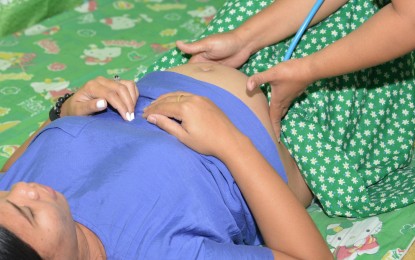
UNPLANNED. An August 2020 study of the University of the Philippines and United Nations Population Fund showed a 42-percent increase in unintended pregnancies among Filipinos last year. In response, Commission on Population and Development chief Dr. Juan Antonio Perez III said Friday (April 9, 2021) the commission and the social welfare department would start a social protection program to guide and assist adolescents. (Photo courtesy of PopCom)
MANILA – The Commission on Population and Development (PopCom) will start a social protection program for adolescents with unintended pregnancies.
The program, in partnership with the Department of Social Welfare and Development (DSWD), is eyed for launch by the third quarter of 2021, PopCom chief Dr. Juan Antonio Perez III told the Philippine News Agency (PNA) on Friday.
"The Philippine government will strive to meet their needs constantly and comprehensively through constant communication with the young heads of families," Perez said, adding that PopCom was tapped by Congress to develop the program.
It will have multidimensional sources of protection, such as the possible provision of livelihood.
“These elements will ensure young people everywhere will have meaningful participation and safe spaces during these times, as the pandemic unleashes a host of challenges,” he said.
The move was a response to a University of the Philippines Population Institute (UPPI) and United Nations Population Fund (UNFPA) study that showed a 42-percent increase in unintended pregnancies among Filipinos in 2020.
The increase was about 79,000 additional unintended pregnancies per month during the pandemic.
The results also cited a 67-percent hike in unmet needs for family planning among Filipino women.
One of 10 in the data was an adolescent.
The UPPI and UNFPA conducted the study to estimate the potential impact of the pandemic on key sexual and reproductive health.
The PopCom-DSWD program will prioritize the financially challenged and first-time mothers during the pandemic.
“These adolescents have no decision-making power, economic independence, autonomy, and are considered by many countries as powerless. They face greater risks of repeat pregnancies and are vulnerable to gender-based violence, as well as intergenerational poverty during, and as a result, of their early childbearing,” Perez said.
He said young people need to have access to safe, trusted, and reliable information integrated into services ensuring health, protection, and psychosocial support.
“It is a fulfillment of their constitutional rights under Republic Act 10354, or the Responsible Parenthood and Reproductive Health Act of 2012,” Perez added.
He said isolation and physical-distancing measures stemming from the pandemic’s safety protocols could be limiting the capacity of the youth to exercise their rights. (PNA)
